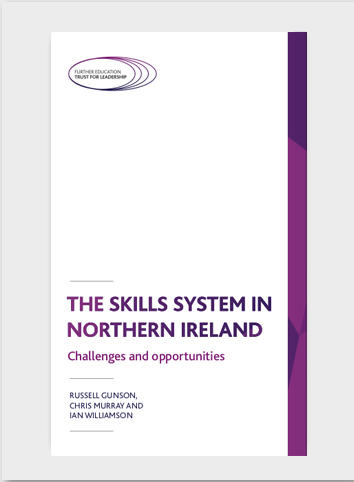
The Skills System in Northern Ireland
The skills system will be crucial to meeting the challenges and changes facing Northern Ireland in the coming years. The skills system, through its learners and the employers it works with, can be at the centre of driving the inclusive growth we need to see in Northern Ireland to deliver economic and social justice.
For learners, the skills system could be critical in helping them to secure the best possible life chances, pay increases and career progression, readying them to adapt to changes in the kinds of jobs we do and need. Equally, for employers, the skills system can be at the centre of helping firms to adapt to and exploit opportunities, bring greater efficiencies and productivity, and drive a stronger economic performance in Northern Ireland. For the skills system to do this, it must meet the challenges it faces both now and in the future.
The current economic context in Northern Ireland is central to the challenges facing the skills system, particularly at post-school, sub-degree level. Northern Ireland has higher economic inactivity and levels of people with no qualifications than the rest of the UK. Productivity is one of the UK’s biggest underlying structural economic problems: it is worse in Northern Ireland than in any other part of the UK. Career progression rates are by far the lowest in the UK, and the median income is lower than the UK average. Northern Ireland has an economy populated with small and medium enterprises, with high numbers of microbusinesses. These factors define the scope of action in which the skills system must operate. At the same time, the skills system can be central to addressing some of Northern Ireland’s social inequalities: low pay, high levels of poverty and low levels of career progression.
These factors set the challenging terms in which the skills system in Northern Ireland operates. Equally, the skills system has been through a period of change in recent years. There has been a consistent pace of reform, with a range of new strategies designed to meet the demand from employers for skills and to boost levels of skills in Northern Ireland. This can be seen through reforms such as the mergers of colleges, the introduction of the apprenticeship levy, the introduction of programmes like Higher Level Apprenticeships and the innovative Assured Skills scheme, and inclusion of colleges within innovation strategies.
Yet the skills system does not operate in isolation, and a number of external factors will determine how effective skills policy is over the coming years. Automation and technological change, Brexit, the changing nature of globalisation and future funding challenges across the UK will have direct and indirect influence over Northern Ireland’s future. These will affect the future economic and social context in which the skills system will be operating.




















































































